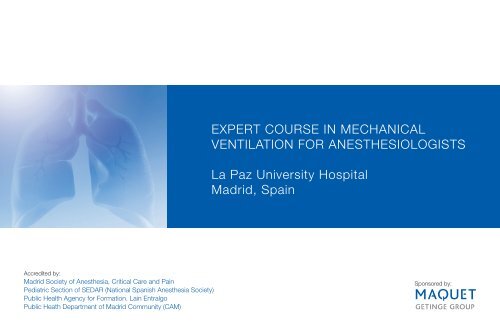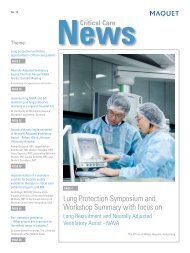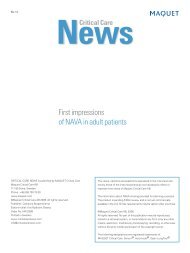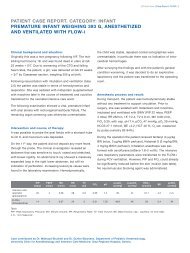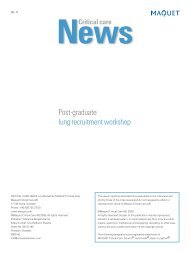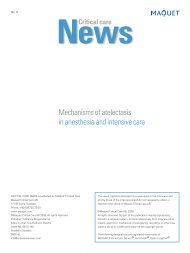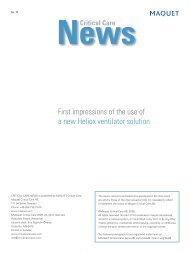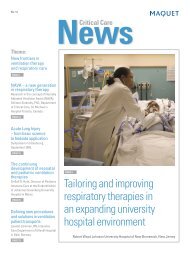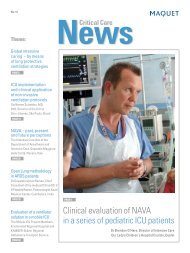EXPERT COURSE IN MECHANICAL VENTILATION FOR ...
EXPERT COURSE IN MECHANICAL VENTILATION FOR ...
EXPERT COURSE IN MECHANICAL VENTILATION FOR ...
You also want an ePaper? Increase the reach of your titles
YUMPU automatically turns print PDFs into web optimized ePapers that Google loves.
<strong>EXPERT</strong> <strong>COURSE</strong> <strong>IN</strong> <strong>MECHANICAL</strong><br />
<strong>VENTILATION</strong> <strong>FOR</strong> ANESTHESIOLOGISTS<br />
La Paz University Hospital<br />
Madrid, Spain<br />
Accredited by:<br />
Madrid Society of Anesthesia, Critical Care and Pain<br />
Pediatric Section of SEDAR (National Spanish Anesthesia Society)<br />
Public Health Agency for Formation. Lain Entralgo<br />
Public Heath Department of Madrid Community (CAM)<br />
Sponsored by:
Organizers<br />
ORGANIZERS AND SCIENTIFIC COMMITTEE<br />
Dr. D. Javier Garcia Fernandez. Department of Anesthesia and Intensive Care, La Paz Universitary Hospital.<br />
Dr. D. Luis Goldman. Department of Anesthesia and Intensive Care, La Paz Universitary Hospital.<br />
Dr. D. Francisco Reinoso. Department of Anesthesia and Intensive Care, La Paz Universitary Hospital.<br />
Profa. Dña. Paloma Garcia. Professor of the Veterinary School. UCM. Madrid.<br />
Prof. D. Ignacio Álvarez Gomez. Professor of the Veterinary School. UCM. Madrid.<br />
FACULTY<br />
Dr. D. Javier Belda. Department of Anesthesia and Intensive Care. H. Clinic Univ. de Valencia.<br />
Dr. D. Luis Castro Department of Anesthesia and Intensive Care, La Paz Universitary Hospital.<br />
Dr. D. Javier Garcia Fernandez. Department of Anesthesia and Intensive Care, La Paz Universitary Hospital.<br />
Dr. D. Luis Goldman. Department of Anesthesia and Intensive Care, La Paz Universitary Hospital.<br />
Dr. D. Francisco Reinoso. Department of Anesthesia and Intensive Care La Paz Universitary Hospital.<br />
Dr. D. Fernando Suarez Sipmann. Critical Care. Foundation Jimenez Díaz-Capio.
organizer contact information<br />
technical secretariat<br />
Hospital La Paz Foundation.<br />
contact<br />
web: www.ventilacionanestesiapediatrica.com<br />
e-mail: ventilacionanestesiapediatrica@gmail.com<br />
e-mail: ventilacionanestesiapediatrica@hotmail.com
WELCOME<br />
OBJECTIVES<br />
This accredited course will familiarize participants with<br />
anesthesia circuits and ventilation techniques in both open<br />
and circular circuits. It is designed for anesthesiologists<br />
who want to master the difficult subject of mechanical<br />
ventilation in anesthesia and critical care.
<strong>COURSE</strong> STRUCTURE<br />
14 THEORETICAL SESSIONS, 4 CL<strong>IN</strong>ICAL CASE<br />
DISCUSSIONS AND 4 WORKSHOPS<br />
The course will take place over the three<br />
consecutive days, Thursday and Friday include<br />
morning and afternoon sessions and Saturday a<br />
morning session. We will work with anesthesia<br />
stations, critical care ventilators, and in vivo and ex<br />
vivo pig lungs to simulate critical clinical situations.<br />
The technical theoretical curricula will be supplied<br />
via internet to participants before the course and the<br />
remaining material at the beginning of the course:<br />
Book, laboratory workbooks, Javierito CD Simulator,<br />
CD presentations and CD workshop videos.<br />
We will begin with a small review test of our basic<br />
knowledge of mechanical ventilation and a final<br />
test to evaluate the acquired knowledge for credits.<br />
Theoretical classes are 1 hour, with 40 minutes<br />
theory and an additional 20 minutes for questions<br />
and practical examples.<br />
A lunch will officially close the course at mid-day<br />
Saturday followed by a guided tour of the principal<br />
sightseeing spots of Madrid for those who wish to<br />
attend.
<strong>IN</strong><strong>FOR</strong>MATION<br />
LOCATION AND COST<br />
Place La Paz University Hospital, Madrid, Spain<br />
Date November 5 – 7, 2010<br />
Cost Course fee EUR 1 000<br />
Optional full service EUR 670 (Three nights in a 4 star hotel,<br />
two dinners in typical Spanish restaurants in the center of<br />
Madrid with the course professors, transportation to and from<br />
the hotel, and a guided tour of Madrid on Saturday afternoon.)
AGENDA DAY 1<br />
▪ ▪ “Ventilatory monitoring”, Dr Luis Goldman<br />
Dr. Javier Garcia<br />
▪ ▪ “Interpretation of the Pressure, Flow and Volume vs. Time<br />
curves in mechanical ventilation”, Dr Javier Garcia<br />
▪ ▪ “Interpretation of mechanical ventilation loops: Pressure-<br />
Volume, Flow-volume/ Pressure-volume, Flow-volume”, Dr<br />
Javier Garcia<br />
▪ ▪ “Mechanical ventilation: A physiological approach”, Dr Javier Garcia<br />
▪ ▪ “Anesthesia workstation: circular circuit”, Dr Javier Garcia<br />
▪ ▪ ”Low flow anesthesia: An easy and safe way to do it”, Dr Javier Belda,<br />
▪ ▪ “Mechanical ventilation anesthesia in special situations:<br />
Obesity, laparoscopy, thoracic surgery”, Dr Javier Belda<br />
▪▪<br />
Circular Circuit Workshop: The “Javerito” circular circuit<br />
simulator, Dr Javier Garcia<br />
▪▪<br />
Presentation of two clinical patient cases for discussion and<br />
questions
AGENDA DAY 2<br />
▪ ▪ “Ventilatory modes: an easy and functional way to understand<br />
them”, Dr Javier Garcia<br />
▪ ▪ “Pressure modes vs volume modes: When, why to use each<br />
one”, Dr Javier Garcia<br />
▪ ▪ “How to program critical care ventilator respecting the patient’s<br />
physiological needs”, Dr Javier Garcia<br />
▪ ▪ “Pulmonary recruitment maneuvers with conventional<br />
ventilation” Dr D Fernando Suarez<br />
▪ ▪ “New advances in mechanical ventilation (technology):<br />
Optimum PEEP and NAVA”, Dr D Fernando Suarez<br />
▪ ▪ “Workshop in OR with animal model (pig) (see next page)<br />
▪ ▪ “Sedation techniques in mechanical ventilation”, Dr D Fransisco<br />
Reinoso<br />
▪▪<br />
Presentation of two clinical patient cases for discussion and<br />
questions
WORKSHOPS DAY 2<br />
Workshop in OR with animal model (pig) - Clinical applications of the acquired knowledge<br />
Mechanical ventilation with an anesthesia machine:<br />
▪▪<br />
How to program an anesthesia machine respecting<br />
the patient’s physiological needs<br />
▪▪<br />
How to do pulmonary recruitment with an anesthesia<br />
machine<br />
▪▪<br />
How to do low-flow anesthesia<br />
▪▪<br />
How to resolve the most common problems that may<br />
occur with an anesthesia machine<br />
▪▪<br />
Protocol for action in patient desaturation inside of the OR<br />
▪▪<br />
How to ventilate a patient with morbid obesity<br />
▪▪<br />
How to ventilate in laparoscopic surgery<br />
▪▪<br />
How to manage a bronchospasm<br />
▪▪<br />
How to ventilate during thoracic surgery<br />
▪▪<br />
How to ventilate a neonate<br />
Mechanical ventilation with an critical care ventilator:<br />
▪▪<br />
How to program critical care ventilator respecting the<br />
patient’s physiological needs<br />
▪▪<br />
How to perform pulmonary recruitment maneuvers<br />
▪▪<br />
How to program the optimum PEEP for each patient<br />
▪▪<br />
How to do protective pulmonary ventilation<br />
▪▪<br />
Ventilatory modes: a different way to understand and<br />
classify them<br />
▪▪<br />
How to ventilate in a Acute Respiratory Distress<br />
Syndrome<br />
▪▪<br />
Methods of weaning from mechanical ventilation:<br />
Pressure Support, Volume Support, NAVA, CPAP
AGENDA DAY 3<br />
▪ ▪ “Summarizing: what are the main differences between<br />
open circuit and circular circuit and how to ventilate<br />
safely with both ventilators”<br />
▪ ▪ ”Summary of the main differences in mechanical<br />
ventilation between anesthesia and intensive care”<br />
▪▪<br />
Workshop: “Visualizing mechanical ventilation” With<br />
an isolated pig lung model we will go over all the main<br />
concepts for ventilating safely and physiologically adapted<br />
both with an anesthesia workstation and with a critical<br />
care ventilator in normal and pathological clinical situations<br />
▪▪<br />
Test for accreditation of the acquired knowledge
REGISTRATION AND <strong>IN</strong>QUIRIES<br />
This accredited course in mechanical ventilation<br />
is designed for anesthesiologists with at least<br />
4 years’ experience in ventilation techniques. It<br />
is especially appropriate for professionals such<br />
as Chief of Departments, Unit Coordinators or<br />
Resident Tutors who are responsible for training<br />
other professionals.<br />
Only 14 participants will be allowed per course.<br />
course professors; a DVD with the ventilation<br />
workshops; and a multimedia CD with the<br />
“Javerito” simulator, as well as workshops,<br />
diploma, and official accreditation. Coffee and<br />
two working lunches and a final lunch in a typical<br />
Madrid restaurant are included.<br />
Please also see the optional full service enrollment<br />
offer on the Information page.<br />
The enrollment fee includes classes, preparatory<br />
and course documentation; the book by the<br />
Registration and questions can be addressed to<br />
isabell.lundell@maquet.com
<strong>EXPERT</strong> <strong>COURSE</strong><br />
<strong>IN</strong> <strong>MECHANICAL</strong> <strong>VENTILATION</strong><br />
<strong>FOR</strong> ANESTHESIOLOGISTS<br />
Sponsored by:


